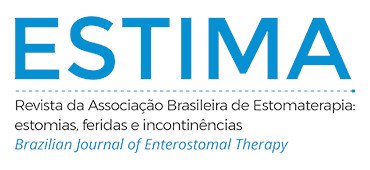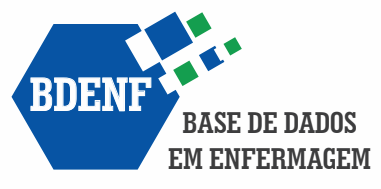ADHESION OF ASSISTANCE PROTOCOL ON NASOENTERAL CATHETER FIXATION
Abstract
Objective: To verify the adherence of the nursing team to a care protocol for the fixation of a nasoenteral catheter, after a health education action. Methods: Quantitative, cross-sectional, field, observational and descriptive study in a hospital in the city of Rio de Janeiro. It consisted of two stages: health education action on a nasoenteral catheter fixation protocol and data collection after health education action, in the form of non-participant observation, using an instrument containing information regarding the presence of fixation, type of fixation, record of the date of the procedure and conditions of fixation of the nasoenteral catheter. Results: Health education actions encompassed the participation of 133 nursing professionals. Of the 123 patients observed, 100% had fixation, the most prevalent being nasal fixation (60.16%/n = 74). In 68.29% (n = 84) there was no date record, 95.93 (n=118) and 87.80% (n = 108) had good cleaning and adherence conditions, respectively. Conclusion: A satisfactory result was not achieved regarding adherence to the type of fixation and registration of the date of the procedure. Despite the unsatisfactory adherence, there was a high positive correlation between the professionals’ adherence to the education actions and the correctness ratio of the type of fixation.
Downloads
Metrics
References
Motta APG, Rigobello MCG, Silveira RCCP, Gimenes FRE. Nasogastric/nasoenteric tube-related adverse events: an integrative review. Rev Latino-Am Enfermagem. 2021;29:e3400. https://doi.org/10.1590/1518-8345.3355.3400
Powers J, Brown B, Lyman B, Escuro AA, Linford L, Gorsuch K, et al. Development of a Competency Model for Placement and Verification of Nasogastric and Nasoenteric Feeding Tubes for Adult Hospitalized Patients. Nutr Clin Pract. 2021;36(3):517-533. https://doi.org/10.1002/ncp.10671
Conselho Federal de Enfermagem (COFEN). Resolução COFEN nº 619/2019. Normatiza a atuação da Equipe de Enfermagem na Sondagem Oro/nasogástrica e Nasoentérica. Brasília; 2019. [citado 10 set 2021]. Disponível em: http://www.cofen.gov.br/resolucao-cofen-no-619-2019_75874.html
Macedo ABT, Assis MCS, Milioni KC, Canto DF, Souza CMB, Chaves EHB. Elaboration and validation of a protocol for safe administration of enteral nutrition in hospitalized patients. Rev Gaúcha Enferm. 2021;42(Esp.):e20200181. https://doi.org/10.1590/1983- 1447.2021.20200181
Gimenes FRE, Pereira MCA, Prado PR, Carvalho REFL, Koepp J, Freitas LM, Teixeira TCA, Miasso AI. Nasogastric/Nasoenteric tube-related incidents in hospitalised patients: a study protocol of a multicentre prospective cohort study. BMJ Open. 2019;9:e027967. https://doi.org/10.1136/bmjopen-2018-027967
Colaço AD, Nascimento ERP. Nursing intervention bundle for enteral nutrition in intensive care: a collective construction. Rev Esc Enferm USP. 2014;48(5):844-850. https://doi.org/10.1590/S0080-6234201400005000010
Corrêa APA, Dalla Nora CR, Santos VJ, Viegas GL, Agea JLD, Oliveira ACS, Beghetto MG. Risks of enteral nutritional therapy: A clinical simulation. Rev Gaúcha Enferm. 2020;41(Esp.):e20190159. https://doi.org/10.1590/1983-1447.2020.20190159
Xelegati R, Gabriel CS, Dessotte CAM, Zen YP, Évora YDM. Eventos adversos relacionados ao uso de equipamentos e materiais na assistência de enfermagem a pacientes hospitalizados. Rev Esc Enferm USP. 2019;53:e03503. https://doi.org/10.1590/s1980-220x2018015303503
Mukaka MM. Statistics Corner: A guide to appropriate use of Correlation coefficient in medical research. Malawi Med J. 2012;24(3):69-71.
Petroianu A, Petroianu J. Fastening technique of nasogastric and nasoenteric tubes. Rev Col Bras Cir. 2010;37(1):70-71. https://doi.org/10.1590/S0100-69912010000100014
Potter PA, Stockert PA, Perry AG, Hall AM. Fundamentos de enfermagem. 9ª ed. Rio de Janeiro: Guanabara Koogan; 2018.
Dantas CMM. Relatório técnico/científico: protótipo de fixador de tubos orotraqueais, sondas nasogástricas, sondas enterais e balão de Sengstaken-Blakemore com tracionador regulável por molas [dissertação]. Vassouras: Universidade de Vassouras; 2021.
Taylor SJ, Allan K, Clemente R, Marsh A, Toher D. Feeding tube securement in critical illness: implications for safety. Br J Nurs. 2018;27(18):1036-1041. https://doi.org/10.12968/bjon.2018.27.18.1036
Inayat F, Ur Rahman A, Almas T, Zahid E, Zervos X. Nasal Bridles for Securing Nasoenteric Feeding Tubes: A Review of Clinical Effectiveness and Potential Complications. Cureus. 2020;12(5):e8325. https://doi.org/10.7759/cureus.8325
Puricelli MD, Newberry CI, Gov-Ari E. Avulsed Nasoenteric Bridle System Magnet as an Intranasal Foreign Body. Nutr Clin Pract. 2016;31(1):121-124. https://doi.org/10.1177/0884533615611858
Herdman TH, Kamitsuru S, Lopes CT. NANDA International Nursing Diagnoses: Definitions & Classification, 2021-2023. 12a ed. New York: Thieme Medical; 2021.
Galetto SGS, Nascimento ERP, Hermida PMV, Busanello J, Malfussi LBH, Lazzari DD. Medical device-related pressure injury prevention in critically ill patients: nursing care. Rev Bras Enferm. 2021;74(2):e20200062. https://doi.org/10.1590/0034-7167-2020-0062
Schroeder J, Sitzer V. Nursing Care Guidelines for Reducing Hospital-Acquired Nasogastric Tube–Related Pressure Injuries. Crit Care Nurse. 2019;39(6):54-63. https://doi.org/10.4037/ccn2019872
Brugnolli A, Ambrosi E, Canzan F, Saiani L. Securing of naso-gastric tubes in adult patients: A Review. Int J Nurs Stud. 2014;51(6):943-950. https://doi.org/10.1016/j.ijnurstu.2013.12.002
Mahoney C, Veitch L. Interventions for maintaining nasogastric feeding after stroke: An integrative review of effectiveness and acceptability. J Clin Nurs. 2018;27(3-4):e427-e436. https://doi.org/10.1111/jocn.14013
Oliveira JA, Spagnol CA, Camargos AT, Matos SS, Silva SF, Oliveira JM. Educação permanente em enfermagem no centro de tratamento intensivo. Rev Enferm UFPE on line. 2020;14:e244644. https://doi.org/10.5205/1981-8963.2020.244644
Garcia JVM, Costa MSCR, Pereira OV, Castro CC, Soares HCB, Ramos AMPC. Educação permanente em oncologia em um Hospital Universitário Federal. Rev Enferm UFPI. 2019;8(2):4-9. https://doi.org/10.26694/2238-7234.824-9
Macêdo WTP, Figueiredo BM, Reis DST, Barros SHP, Ramos MCA, Silva SED. Adesão dos profissionais de enfermagem às práticas educacionais. R Pesq Cuid Fundam Online. 2019;11(4):1058-1064. https://doi.org/10.9789/2175-5361.2019.v11i4.1058-1064
Zampollo N, Contrin LM, Beccaria LM, Frutuoso IS, Rodrigues AMS, Wernek AL. Adesão ao protocolo de identificação do paciente e medicação segura. Rev Enferm UFPE on line. 2018;12(10):2667-2674. https://doi.org/10.5205/1981-8963-v12i10a234885p2667-2674-2018
Almeida LP, Cortez EA, Valente GSC, Rego SM, Ferreira AF, Fernandes ACM. A não utilização dos procedimentos operacionais padrão por profissionais de saúde em um centro de diálise. Rev Enferm Atual In Derme. 2017;Esp.:11-18. https://doi.org/10.31011/reaid-2017-v.2017-n.0-art.546
Downloads
Published
How to Cite
Issue
Section
License
Copyright (c) 2022 Aline Coutinho Sento Sé, Raquel Costa e Silva de Oliveira, Gesiane dos Santos Trivino, Ivanete de Souza Lobato, Flavia de Melo Medeiros, Raquel Calado da Silva Gonçalves, Luana Cardoso Pestana, Eduardo Ferreira Gonçalves, Teresa Tonini, Nébia Maria Almeida de Figueiredo

This work is licensed under a Creative Commons Attribution 4.0 International License.

























